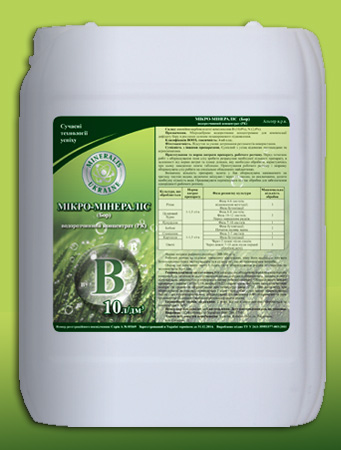 Using of Micro-Mineralis (Boron + ME) microfertilizer eliminates boron deficiency in plants, regulates pollination as well as carbon and protein metabolism, and stimulates synthesis of hormones. Increases productivity and quality of crops. Increases immunity and resistance of plants to bacterial diseases.
Using of Micro-Mineralis (Boron + ME) microfertilizer eliminates boron deficiency in plants, regulates pollination as well as carbon and protein metabolism, and stimulates synthesis of hormones. Increases productivity and quality of crops. Increases immunity and resistance of plants to bacterial diseases.
Micro-Міneralis (Boron + ME) microfertilizer composition,
ammonium-carboxylate chelates, %
|
B |
N |
|
10,0 |
2,0 |
Boron in plants life
Deficiency of boron in plants leads to:
- Accumulation of phenols (toxic compounds of plant vital activity).
- Inhibition of generative organs’ development: decrease in number of flowers and ovaries, reduction of number of pods and seeds (rapeseed), hollowing of fruits (beets, potatoes), brown rot development (cabbage), top browning, stasis of leaves (sunflower).
- Deformation of leaves.
- Undevelopment of pollen.
Advantages of Micro-Міneralis (Boron + ME)
- Due to the innovative production technology it does not create phytotoxic effects on plants.
- Contains a number of microelements, which facilitate rapid and full absorption of boron by plant.
- Facilitates development of generative organs.
- Increases number of flowers and prevents their infertility.
- Improves ability of plants to resist bacterial diseases, hollowing of fruits and rottening.
- Increases content of sugars.
- Increases storage time of products.
Usage
Application rate of Micro-Міneralis (Boron + ME)
|
Processed culture |
Application |
Stage of culture development |
Maximum |
|
Rapeseed |
1,0-1,5 l/ha |
stage of 4-6 leaves; restoration of vegetation; |
3 |
|
Sugar Beet |
stage of 6-8 leaves; stage of 10-12 leaves; |
3 |
|
|
Corn |
stage of 7-10 leaves |
1 |
|
|
Legumes |
1,0-1,5 l/ha |
budding stage; beginning of grain filling |
2 |
|
Sunflower |
stage of 5-7 pairs of leaves |
1 |
|
|
Potato |
budding stage |
1 |
|
|
Vegetable |
Foliar fertilizing: 2 weeks |
3 |
Application rate of working solution: 200-300 l/ha for field crops.




